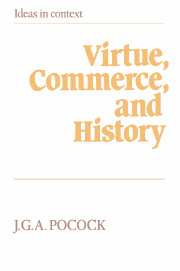 Virtue, Commerce, and History
Virtue, Commerce, and History Book contents
- Frontmatter
- Contents
- 1 Introduction: The state of the art
- PART I
- PART II
- 5 Modes of political and historical time in early eighteenth-century England
- 6 The mobility of property and the rise of eighteenth-century sociology
- 7 Hume and the American Revolution: The dying thoughts of a North Briton
- 8 Gibbon's Decline and Fall and the world view of the Late Enlightenment
- 9 Josiah Tucker on Burke, Locke, and Price: A study in the varieties of eighteenth-century conservatism
- 10 The political economy of Burke's analysis of the French Revolution
- PART III
- Index
9 - Josiah Tucker on Burke, Locke, and Price: A study in the varieties of eighteenth-century conservatism
Published online by Cambridge University Press: 05 May 2010
- Frontmatter
- Contents
- 1 Introduction: The state of the art
- PART I
- PART II
- 5 Modes of political and historical time in early eighteenth-century England
- 6 The mobility of property and the rise of eighteenth-century sociology
- 7 Hume and the American Revolution: The dying thoughts of a North Briton
- 8 Gibbon's Decline and Fall and the world view of the Late Enlightenment
- 9 Josiah Tucker on Burke, Locke, and Price: A study in the varieties of eighteenth-century conservatism
- 10 The political economy of Burke's analysis of the French Revolution
- PART III
- Index
Summary
Early in 1946, an assistant lecturer and a lecturer in history found themselves sharing an office, as it would now be called, of Victorian granite and fiberboard partitions, forming part of what had been a gallery running above the archway of the Rolleston Avenue entrance to the old buildings of what was then Canterbury University College in the University of New Zealand. Both were newly appointed to their duties, the one just graduated and the other just returned from the wars. Between them, they increased the teaching members of their department from two to four. Both were men of independent personality who came to think it a matter of credit to each that they shared their quarters so cordially. In time, however, their ways parted. The assistant lecturer went in pursuit of a doctorate and entered upon a complex orbit that was to pass through Canterbury's gravitational field again. The lecturer, a more stable and powerful luminary unafraid of dog days, remained to become a professor of history and in due course vicechancellor of the University of Canterbury in the times of its centennial and its migration to a new campus. Under whatever signs are now in the ascendant, the assistant lecturer offers the lecturer an essay upon a subject, and related to a personality, both of which have always meant much to him.
- Type
- Chapter
- Information
- Virtue, Commerce, and HistoryEssays on Political Thought and History, Chiefly in the Eighteenth Century, pp. 157 - 192Publisher: Cambridge University PressPrint publication year: 1985
- 6
- Cited by
